
The Westview School Blog
Executive Functioning for Real Life: Supporting Routine, Time, and Responsibility at Home
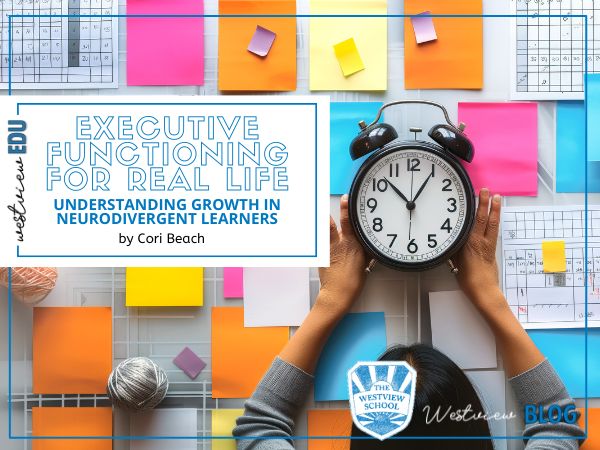
Executive functioning comes up a lot in conversations about learning and behavior, but it can feel vague or overwhelming. What does it actually mean? And more importantly, what can families do at home that truly helps?
In a recent Westview EDU session, Cori Beach, Coordinator of Student, Family, and Community Engagement at The Westview School, shared practical, realistic ways to support executive functioning through everyday routines. Her focus was simple: tools you can actually use, starting right now.
What Is Executive Functioning, Really?
Executive functioning refers to a set of skills we use every day to manage our lives. These include:
- Starting and completing tasks
- Managing time and transitions
- Regulating emotions
- Organizing materials
- Problem-solving and prioritizing
- Monitoring and adjusting our work
These skills are not innate. They are learned through modeling, repetition, and practice over time. Many of us forget that we learned our own systems by watching others. Timers, calendars, checklists, routines, and mental shortcuts did not appear magically. Someone showed us, and we practiced until they became habits.
For our students, especially those with autism, executive functioning challenges can feel bigger. Task initiation, transitions, and emotional regulation often require extra support. That does not mean students are unmotivated or lazy. It means they are still building skills.
Why Executive Functioning Matters
Executive functioning affects almost every part of the day:
- Morning and evening routines
- Hygiene and self-care
- Homework and responsibilities
- Transitions between activities
- Emotional responses and flexibility
When these skills are supported, students feel more confident and capable. When they are not, even small tasks can feel overwhelming. The goal is not perfection. The goal is progress and independence.
Making Time Visible
One of the most common challenges Cori discussed is time blindness. Time is abstract. Five minutes can feel like forever, while twenty minutes can disappear in an instant.
A key strategy is making time visible. Tools like analog clocks, visual timers, or the Time Timer app help students see how much time is passing. When time becomes concrete, it becomes easier to plan around it.
Other helpful strategies include:
- Giving warnings before transitions
- Using short work periods followed by movement breaks
- Focusing on transitions rather than speed
Estimating Time Together
A powerful and eye-opening activity is comparing estimated time versus actual time.
Pick one task, such as brushing teeth or getting ready for school. Ask your child how long they think it takes. Write it down. Then time it together. Compare the results.
This works for all ages and builds awareness without judgment. Over time, students begin to understand how long tasks really take and how to plan accordingly.
Why Routines Matter
Routines reduce anxiety because they answer the question, “What’s next?”
When routines are predictable and consistent, working memory has less to hold onto. Students can rely on order rather than constant reminders. Visual checklists and simple schedules help at every age.
Consistency matters more than perfection. Even during breaks or vacations, keeping the same task order helps routines return more easily when school resumes.
The Power of a Launch Pad
A launch pad is a designated space where everything needed for the next day is placed the night before. It can be as simple as a taped square on the floor, a doormat, or a small basket.
Backpacks, lunch bags, sports equipment, and devices all go there. The goal is to eliminate morning stress and last-minute scrambling.
Responsibilities, Not Chores
Cori emphasized using the word 'responsibility' instead of 'chore'. Responsibilities build independence, sequencing, and confidence. They are not punishment. They are practice for real life.
Start small. Break tasks into clear steps. Model the process. Celebrate effort before perfection.
Start Small
The takeaway from the session was clear: do not try to change everything at once.
Pick one routine to focus on. One responsibility. One time-awareness activity. Practice it together. Adjust as needed. Build slowly.
Executive functioning grows with repetition, patience, and trust. When families and schools work together, those skills begin to show up not just at home, but everywhere students go.
--
Cori Beach is the Coordinator of Student, Family, and Community Engagement at The Westview School. In this role, Cori builds the relationships that help students and families feel understood and connected. With a background in education and a strong commitment to relationship-centered learning, Cori is passionate about creating meaningful connections that support growth and belonging. In her role at Westview, she partners with families, school staff, professionals, and community members to help students pursue real-life goals in ways that reflect their strengths and interests.
This blog post was adapted from the presentation given during WestviewEDU on Thursday, January 8, 2026. WestviewEDU is an education series presented by The Westview School for parents and caregivers of children with autism. For a complete list of WestviewEDU sessions remaining for the 2025-2026 academic calendar year, visit The Westview School online.
Visual Supports to Build Independence: Teacher Techniques That Transform Learning

At The Westview School, we believe that fostering independence is a cornerstone of helping children with autism thrive academically, socially, and emotionally. One of the most effective tools in this journey is the use of visual supports. Visual supports use images, symbols, or cues to help students process information, communicate clearly, and navigate their day. Some examples of this include picture schedules, checklists, social stories, timers, and task cards.
From managing daily routines to enhancing emotional regulation and problem-solving, visual supports empower students with confidence and autonomy. Westview teachers and administrators integrate these strategies into their classrooms every day. Each approach reflects the creativity and dedication of Westview staffers to ensure every student has the tools they need to succeed.
Morning Checklists: Starting the Day with Independence
Christine Reilly, Lower Elementary Teacher
Executive functioning skills, such as organization and time management, can be challenging for children with autism. Visual checklists provide a structured approach to these challenges. In Lower Elementary, students start their day with a visual checklist displayed on the board detailing morning expectations. For example, a picture of a backpack represents hanging it on a hook. As the year progresses, these picture prompts are gradually replaced with words, and eventually, students complete tasks independently without visual assistance.
"This approach not only creates a predictable environment but also reduces anxiety and fosters a sense of accomplishment," says Christine Reilly. "Students feel confident knowing they can take responsibility for their morning routine."
Transition Cues: Easing the Shift Between Activities
Trevie Stone, Lower School Physical Education Teacher
Transitions, particularly away from preferred activities, can be challenging for many students. Leaving the motor room can often be a tricky transition. Visual timers, such as the TimeTimer™, paired with verbal countdowns, help students understand the abstract concept of time.
"I might say, 'We have five minutes left. What would you like to do before we leave?'" explains Trevie Stone. "Picture cards are another helpful tool. A small picture of the next activity or location can be a tangible reminder, helping students anticipate what's next."
The physical setup of the environment also supports transitions. Designated line-up spots and shoe cubbies act as visual cues for students, creating a smooth and predictable flow from one activity to the next.
Innovative Visuals for Younger Students
Amanda Warley, Prekindergarten Teacher
In Prekindergarten, visuals are everywhere—on the walls, at tables, and in task instructions. Amanda Warley recently introduced a portable photo printer to create instant visual aids tailored to her students' needs. "If a student prefers blocks over trains, we can immediately update our visuals to reflect that," she shares.
Amanda also uses visuals to prepare students for new experiences. For example, before practicing for the holiday program in a different building, she printed a photo of the location. “Having a picture helps students process what to expect, reducing anxiety. These personalized visuals make all the difference in fostering understanding and comfort.”
Step-by-Step Task Cards: Building Independence in Learning
Serena Gaylor, Middle School Language Arts Teacher
Breaking down tasks into manageable steps fosters independence and encourages self-assessment. "In my classroom, students always have a 'to-do' list and an 'after I'm finished' list displayed on the screen," says Serena Gaylor.
Recently, during a poetry unit, students followed a criteria-based checklist to evaluate their work. "This allowed them to independently assess their poems, identify areas for improvement, and ask more specific questions," Serena explains. "Step-by-step guides give students the tools to take ownership of their learning and build confidence in their abilities."
Visual Supports for Emotional Regulation
Sally Schwartzel, Lower School Principal
Visual supports also play a vital role in helping students manage their emotions. Tools like visual schedules, checklists, and social narratives provide clarity and predictability, reducing anxiety. "When students know what to expect, they feel more in control of their day," says Sally Schwartzel.
For emotional regulation, visuals can help students identify their feelings and choose appropriate coping strategies. “If a student feels frustrated, visual supports remind them of what they can do—like taking deep breaths or asking for help. This empowers them to navigate challenging moments with greater confidence.”
Empowering Students Through Visual Supports
Visual supports are more than tools; they are bridges to independence, confidence, and self-advocacy. At The Westview School, we take pride in using evidence-based practices to meet our students' unique needs. By integrating creative and personalized strategies, our educators ensure that every child can shine in their own way.
Want to see these approaches in action? Visit our website or connect with us on Instagram and Facebook to learn more about how we are empowering our students every day.
Making a Language Connection: Gestalt Language Processing in Autism
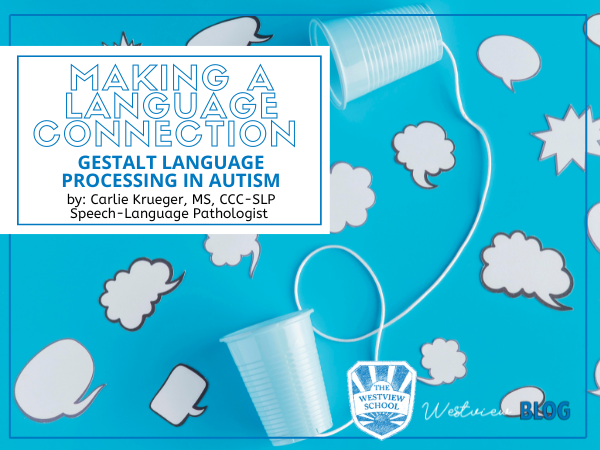
Language is a foundational tool for human connection, but how it's acquired and processed can vary greatly. For individuals on the autism spectrum, language development can sometimes follow a distinctive route called Gestalt Language Processing (GLP). One of the key features of GLP is echolalia—repeating phrases or language chunks they've previously heard. This behavior, sometimes misunderstood as meaningless repetition, actually plays a significant role in language learning. Understanding the nuances of GLP and echolalia can open up new ways to support those with unique communication needs.
What is Gestalt Language Processing?
Gestalt Language Processing is a way of learning and using language where individuals process larger language segments, such as phrases or sentences, rather than focusing on individual words. This approach is grounded in Gestalt psychology, which suggests that our minds perceive things as whole units rather than isolated pieces. For many neurotypical children, language starts with single words and gradually builds into more complex sentences. In contrast, Gestalt language processors often begin by learning language in chunks—phrases they've heard in TV shows, songs, or daily conversations. These segments are memorized and repeated verbatim as the initial step in their language journey. Over time, they learn to break down these chunks and use them flexibly to create novel sentences.
The Role of Echolalia in Gestalt Language Processing
Echolalia, the repetition of previously heard words, phrases, or sounds, is often observed in early GLP language stages, particularly among autistic individuals. There are two primary forms of echolalia: immediate and delayed. Immediate echolalia involves the instant repetition of recently heard phrases, often as a way of processing language or mirroring the emotions conveyed in the interaction. For instance, if someone asks, "Do you want to go outside?" an individual might respond by repeating, "Do you want to go outside?" instead of directly answering. Delayed echolalia, on the other hand, occurs when phrases heard in the past—sometimes days or weeks earlier—are recalled and repeated. This is commonly referred to as scripting. These phrases might stem from movies, TV shows, or previous conversations and can be used to express emotions or communicate specific needs. For example, a child feeling overwhelmed might say, "Let it go!" echoing a familiar Disney lyric to signal their need for a break.
Echolalia as a Key Part of Language Development
Contrary to being a random or meaningless behavior, echolalia is essential to language development within GLP. Instead of focusing on single words, individuals initially store entire phrases as building blocks for language. Through repetition, they start to understand social cues and language patterns. Eventually, they begin to manipulate these stored phrases, breaking them down into individual words and allowing them to construct unique sentences.
Echolalia serves several roles: it helps individuals learn the rhythm and structure of language, allows them to express emotions and experiences that resonate deeply, and sets the foundation for more flexible, self-generated language. For example, a child who frequently says, "It's time to go to bed," might eventually repurpose the word "bed" in new sentences, like "I want my bed," demonstrating growing independence in their language use.
The Connection to Autism: Why Autistic Individuals Often Use Echolalia
Echolalia is especially common among autistic individuals, who frequently use it as a primary method of communication early on. There are several reasons for this. Autistic learners often have an exceptional ability to recognize patterns, and language chunks can serve as familiar patterns they can recall and apply in specific contexts. Additionally, many autistic individuals experience heightened sensory awareness, which may cause them to focus on the tonal and rhythmic aspects of language over individual words. This focus on auditory "wholes" makes echolalia an effective tool for processing language patterns.
Socially, echolalia can bridge the gap between an autistic individual's inner world and the expectations of the social world. By repeating phrases they've heard, they are engaging with language in a way that allows them to participate in social interactions, even if it doesn't follow traditional conversational norms.
Supporting Echolalia and Language Development
When viewed through the lens of GLP, echolalia is not a behavior that needs "correction" but rather a meaningful stage in language development. For those who work with or care for individuals using echolalia, there are several ways to support their language journey.
Acknowledging echolalia as a valid form of communication is essential. Rather than dismissing repeated phrases as meaningless, it's helpful to consider them within the context of the individual's emotions, needs, or attempts to participate in conversations. Providing varied, emotionally engaging language experiences can enrich the language they're absorbing and increase the variety of phrases they can use over time. Patience is key in supporting their language development; each individual progresses at their own pace, and allowing them the freedom to navigate language in a way that feels natural to them is crucial.
Conclusion
Gestalt Language Processing provides an invaluable perspective on how some autistic individuals develop language, highlighting the significance of echolalia as a natural part of that process. For those who process language gestaltically, echolalia is a bridge from memorized phrases to flexible, self-generated language, where each stage supports the next.
Understanding GLP and the role of echolalia allows us to see language development as a spectrum of unique pathways, each worth supporting and celebrating. Embracing this approach not only provides effective support but also empowers individuals to communicate in ways that feel authentic to them, fostering genuine connection and self-expression.
References
Blanc, M. (2012). Natural language acquisition on the autism spectrum: The journey from echolalia to self-generated language. Communication Development Center, Inc.
Peters, A. (1983, 2021). The units of language acquisition. Cambridge University Press.
Prizant, B. (1982). Gestalt language and gestalt processing in autism. Topics in Language Disorders, 3(1), 16-23.
Carlie Krueger, MS, CCC-SLP is a Speech-Language Pathologist at The Stewart Center at The Westview School. She graduated Summa Cum Laude from Utah State University with a B.S. in Communicative Disorders and Deaf Education and obtained her M.S. in Communication Sciences and Disorders from New York University. She strives to practice within a neurodiversity-affirming framework that centers self-advocacy and authenticity for her clients. Carlie has been working full-time as an SLP at The Stewart Center at The Westview School since 2022. If you or your family are interested in learning more about the services The Stewart Center provides, visit us online at The Stewart Center.
From Tantrums to Triumphs: Behavior Strategies at Home and Beyond

Understanding behavior, whether at home or in the community, can feel overwhelming, but it all boils down to one simple fact: behavior is just any measurable action. In this blog post, Sally Schwartzel, Lower School Principal at The Westview School, shares practical strategies for managing behavior by focusing on what we can control—our own actions. From offering choices to teaching replacement behaviors, these insights help parents create more positive interactions with their children. This post was adapted from her presentation for September WestviewEDU.
Behavior: It Is What It Is
When thinking about behavior in the home and community, there are many topics to cover – everything from self-help skills to attending a group function with peers. However, this wide range of topics can all be addressed by looking at behavior for what it is. It’s just behavior! Behavior is any measurable, observable action. Behavior is anything from waving hello to someone to hitting a friend.
The most important thing to remember is that we cannot change the behavior of others. This can be SUPER frustrating! BUT, there are things that we can change. Changing what we are doing, in turn, will change the behaviors of others. To figure out what to do before or after, we need to know “Why” the behavior is occurring. The “Why” is also called the “function” of the behavior. Don’t worry – there are only two main reasons why behaviors occur. PSA: This applies to all people, not just our kids. All of us exhibit behaviors (positive or negative) because we obtain or escape something. Many times, we work for a paycheck (obtain). We also push the snooze button on an alarm – to escape the noise… and the waking up part! To change behavior, we have to change what happens before or after it happens – which is something we can control.
Changing the Before and After
So, what can we do before a behavior happens to prevent it? My favorite is offering a choice – with a catch. The choice isn’t “Are you ready to do your homework?” The choice is “Do you want to do your homework now? Or do you want to do your homework in 5 minutes?” This gives the option to make that choice - but within your parameters. My second biggest recommendation is to frontload expectations. Give your kids a visual schedule or a checklist. Set up a routine. The more our kids know what to expect, the fewer surprises for everyone involved! Think about what a “to-do” list does for you... the schedule/checklist is their “to-do” list!
What about after a behavior occurs? If a person is still exhibiting a behavior, they are either obtaining or escaping something. For example, if a child throws a tantrum in line at the grocery for a candy bar and gets a candy bar, next time, it’s really likely that the child will throw a tantrum again. If a child rips up their homework and doesn’t have to complete it, it will likely get ripped up again. To break that pattern, we need to change what happens after. We can power through the line at the grocery store with the child kicking and screaming. We could have extra copies of the homework or ask for a laminated copy that can’t be ripped. Seems easy enough, right? WRONG. Sometimes, the tantrum in the line in the grocery store is too big. Sometimes, the ripping of homework after a long day is the final straw at the end of a really long day. The missing piece is teaching our kids what to do instead of the challenging behavior.
Teaching Replacement Behaviors
The “what to do instead” is called a replacement behavior. Replacement behaviors get our kids what they want (or don’t want) in a more appropriate way. If we set the expectation at the grocery store as “If you do not throw a tantrum and you ask for a candy bar,” you will get it. If, during homework time, the expectation is that the child can ask for a break or ask for help, that is a much better behavior than ripping it up.
You’re probably thinking, “So I have to let my child get a candy bar every time? Or let them not do their homework?” The answer is… well, kind of. This is only in the beginning while you are teaching those replacement behaviors. Once the child learns they do not need to exhibit those inappropriate behaviors, you can start taking steps back or fading support. For example, the new expectation is “If you do not _____, you can get a snack this time in the line and a candy bar next time.” The expectation can be set at the beginning of the grocery store trip that a candy bar isn’t an option this time, but these three different yummy snacks can be asked for. When it comes to homework, maybe the child needs to write their name on the homework before asking for a break. If the child learns to ask for help, maybe you give them the answer to the first part and then have them complete the rest on their own.
Simple Long-Term Tips for Success
Behavior is so easy and so complicated at the same time. The best advice I can give (learning from different parents throughout the years) is to do what you must to keep your sanity. Tip for doing that and still working behavior to your advantage? Having your child comply with the tiniest directive before giving them a preferred item or activity will save your life in the future. I have had some parents, in order to keep their sanity, have their child simply push in a chair, clear a dish, etc. before iPad time. It seems so small, but it will really help out in the future!
Sally Schwartzel is the Lower School Principal at The Westview School. She brings a wealth of knowledge and experience to The Westview School, having worked for over 18 years in Katy ISD as a special education teacher in specialized autism programs and then as a leader at the district level for autism and behavioral programming. She holds a Master’s Degree in Special Education with a focus on Autism and Developmental Disabilities from The University of Texas. She is a Certified Teacher and a Board Certified Behavior Analyst. She has co-authored and co-presented on relevant topics such as Positive Behavior Interventions and Supports and Autism Support and Intervention Program.
This blog post was adapted from the presentation given during WestviewEDU on Thursday, September 5, 2024. WestviewEDU is an education series presented by The Westview School for parents and caregivers of children with autism spectrum disorder. For a full list of WestviewEDU sessions for the 2024/2025 academic calendar year, visit The Westview School online.
7 Ways to Use Therapeutic Strategies to Work with Your Child at Home
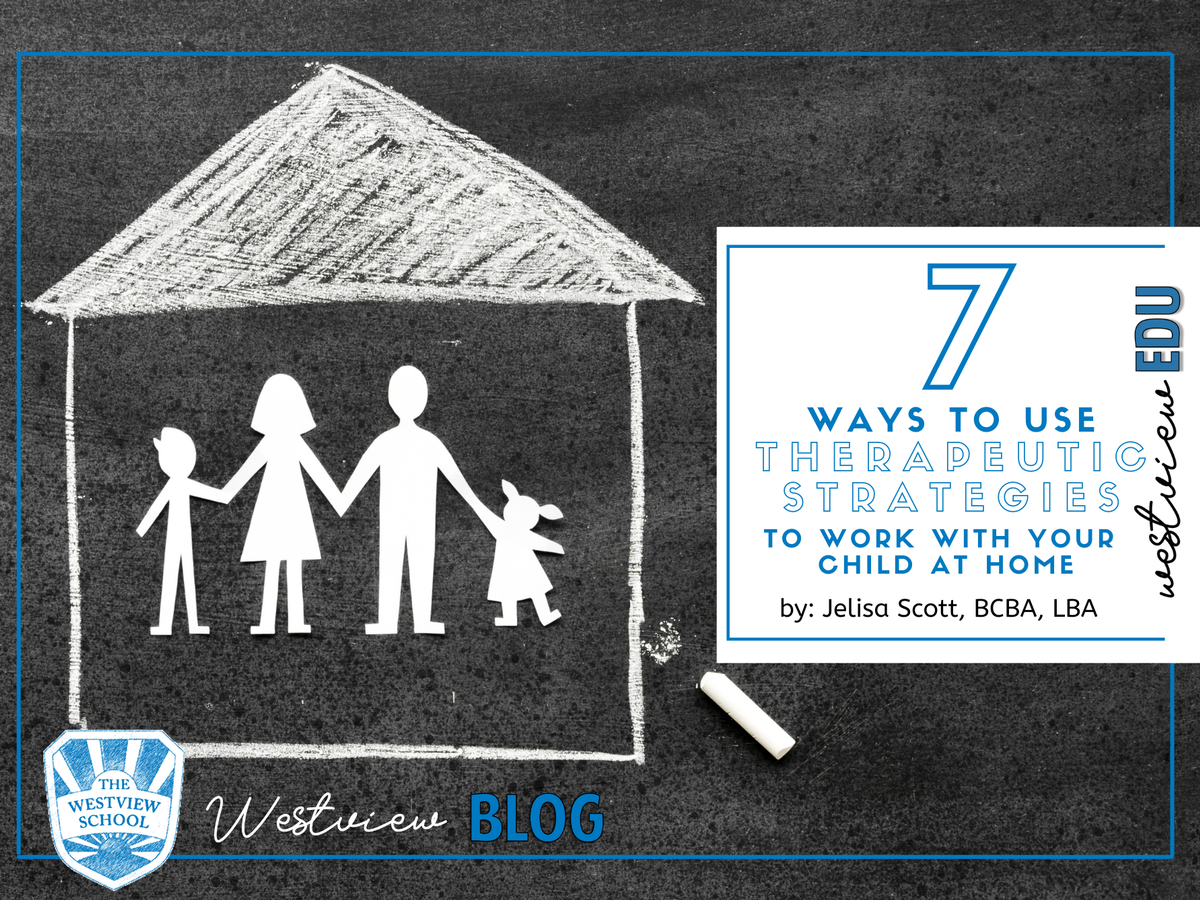
If you have a child on the autism spectrum, it is more than likely that therapy sessions play a part in your monthly calendar. The types of therapy that specifically benefit your child may differ. However, it has been proven that therapy for children with autism spectrum disorder is beneficial to improve behaviors that interfere with your child's ability to learn and support the development of skills needed for children to care for themselves independently. As a parent, you can use therapeutic strategies learned from professionals to help you work with your child at home.
This is not a post about what therapy will work best for your child but one that offers therapeutic strategies you can use to work with your child at home. However, it is essential to make sure the therapy of choice for your child is effective. The best quality therapies have documented evidence of replicated positive effects and don't rely heavily on personal testimonials. Most importantly, you should be receiving parent support from your child's therapist to learn about ways to improve or sustain your child's progress.
The best ways to apply skills that your child has learned in the home are to:
1. Create functional learning opportunities. For example, if your child is working on requesting things they need, set up situations that will help them functionally apply the skills they are learning. Give them a bowl with no spoon or an empty cup with no juice. This will create the opportunity to apply their newly learned skills.
2. Turn mistakes into learning opportunities. Help foster independence and application of problem-solving skills by helping your child find solutions to the mistakes that they have made.
3. Establish and follow through with boundaries and consequences. Be clear with your expectations and do exactly what you say you are going to do. If you say, "First we need to clean up, then we will go to the park," then you should only take them to the park IF they cleaned up first. When you don't follow through with the boundaries you set, you unintentionally teach your child that they don't need to follow your instructions.
4. Reinforce attempts at independence. Reinforcement is the only way to increase the likelihood of them engaging in that independent behavior in the future. Since we want our children to be as independent as they can, we must reinforce their attempts at being independent.
5. Include language used in therapy in the home (and vice versa). Using the language or phrases that your child commonly hears will help promote generalization across settings, like the home and their therapy clinic.
6. Adapt accommodations for home use and portability. Make sure that you can bring any accommodations (ex: visuals, communication devices, sensory tools, etc.) that help make your child successful into the home and community.
7. Evaluate and care for your personal well-being. You will not be able to apply all the previously described strategies without taking care of your own mental, physical, and emotional needs.
Putting these therapeutic strategies into practice at home is a great way to reinforce your child's work in the therapy setting.
--
Jelisa Scott is a Board Certified Behavior Analyst (BCBA) and a Licensed Behavior Analyst (LBA) in the state of Texas. She received her bachelor's in Psychology from Louisiana State University in 2010, her master’s degree in Behavior Analysis from the University of Houston Clear Lake in 2014 and is currently in school to earn her doctorate degree in School Psychology from the University of Houston. Jelisa has been working with children with and without special needs since 2008 and has gained experience providing in-home ABA services, parent training, classroom consultations, navigating ARD meetings, decreasing severe problem behavior, improving verbal behavior, social skills training, and early childhood intervention.
This blog post was adapted from the presentation given during WestviewEDU on Thursday, October 7, 2021. WestviewEDU is an education series presented by The Westview School for parents and caregivers of children with autism spectrum disorder. For a full list of WestviewEDU sessions for 2021/2022 academic calendar year, visit The Westview School online.
What Every Parent Should Know About Pediatric COVID-19 Vaccines

They’re here; they’re here! Whether you’ve been waiting for the children’s COVID-19 vaccines like your kid waits for their birthday or you’re interested but have questions, this is a great milestone in our battle against COVID-19. As fellow Westview parents, we know how important it is to be well-informed, so let’s go over some important points:
How are these vaccines different from the adult ones?
In short, it’s the same formula, just less of it. Children aged 5-11 years old are eligible for the 10 microgram dose, while people 12 years old and up (including adults) are eligible for the 30 microgram dose. We’re expecting that the youngest group of children will be eligible for an even smaller dose (and hopefully soon!). For children, these amounts were chosen at a point that maximizes immune response while minimizing side effects.
Speaking of side effects...
Children tend to have mild to moderate side effects to the vaccines, and like adults, tend to have more side effects with the second vaccine compared to their first one. Side effects include fatigue, fever, headache, pain, chills, and vomiting. It’s tempting, but do not give your child an over-the-counter pain reliever before the vaccine; instead, wait until after the vaccination if needed.
If your child doesn’t have any side effects, don’t worry! The clinical trials did find that children aged 5-11 years had fewer side effects than older children and adults did.
What about heart effects? And fertility effects?
The risk of myocarditis and pericarditis after the COVID-19 vaccine is quite low, and COVID-19 infection is more likely to trigger an inflammation of the heart. In fact, most heart effects, if they occur, are mild and resolve within a few days. If they do occur, it’s important to be seen by your physician.
There is no evidence showing that the COVID-19 vaccine has any effects on fertility. However, there is some concern that COVID-19 INFECTION may negatively affect fertility for males and females.
I got the Moderna or Johnson & Johnson vaccine; should I wait for that version for my kids?
No, we recommend you don’t wait because the Moderna and Johnson & Johnson vaccine trials for children are still underway or in the planning stages. The timeline for the release of those specific vaccines is unclear, so it would be safer to prevent COVID-19 infection with the Pfizer vaccine right now.
My child had COVID-19 recently. Do they still need to be vaccinated?
Yes, they still need to be vaccinated because we don’t know how long immunity after COVID-19 infection lasts, but there have been many cases of people being infected with COVID-19 several times. After COVID-19 infection, kids can be vaccinated as soon as they have recovered and have finished their isolation period.
Sounds good, but WHY should I vaccinate my child?
In a word, TEAMWORK! We have maintained throughout the pandemic that we’re in this together, and it’s especially true now. We vaccinate our children to protect them from getting infected and from developing severe COVID-19 if they get infected. But we also vaccinate our kids to protect our immunocompromised neighbor who makes those amazing brownies, our baby nephew, who is SO CUTE but too young to be vaccinated yet, and everyone else in our circles who is especially vulnerable.
When we vaccinate, we are limiting the number of bodies that COVID-19 can spread to, which is how we can be done with this pandemic. Sure, everyone has a cute collection of masks by now, but we really miss seeing faces!
With the holidays just around the corner, it’s a great time to get those vaccines scheduled so the kids can be fully vaccinated before Santa even makes his list.
Speaking of holidays, travel during winter break may be a possibility if your children complete their COVID-19 vaccines 2 weeks before the trip and are not symptomatic when they get back.
Keep Westview’s COVID-19 protocol chart handy for easy reference and refer to the detailed protocols for additional information.
Where can I go to get my child vaccinated?
Glad you asked! So many places, including your pharmacy, your grocery store, your pediatrician, and most/all of the local hospital systems.
Anything else?
While you’re getting the kids vaccinated against COVID-19 anyway (way to go!!), ask about getting them a flu shot too! We’re expecting a much worse flu season this year, so it would be great to prevent it too. Conveniently, you can get the flu vaccine at the same time as the COVID-19 vaccine. No one wants to be home with COVID-19 or the flu when there’s holiday fun to be had!
One last thing- sometimes, things aren’t so easy and maybe even a bit overwhelming. We’ve all been there. There are many resources to support you and your family at any time.
Wishing everyone an enjoyable holiday season.
--
The Westview School COVID-19 Medical Advisory Board is comprised of Westview parents and former parents with experience on the front line during this pandemic. These highly-trained professionals work in many different fields of medicine, such as epidemiology, pulmonology, and critical care. This group of medical professionals continues to be an invaluable resource to The Westview School leadership team.
Put on Your Oxygen Mask First: 5 Self-Care Strategies for Autism Parents
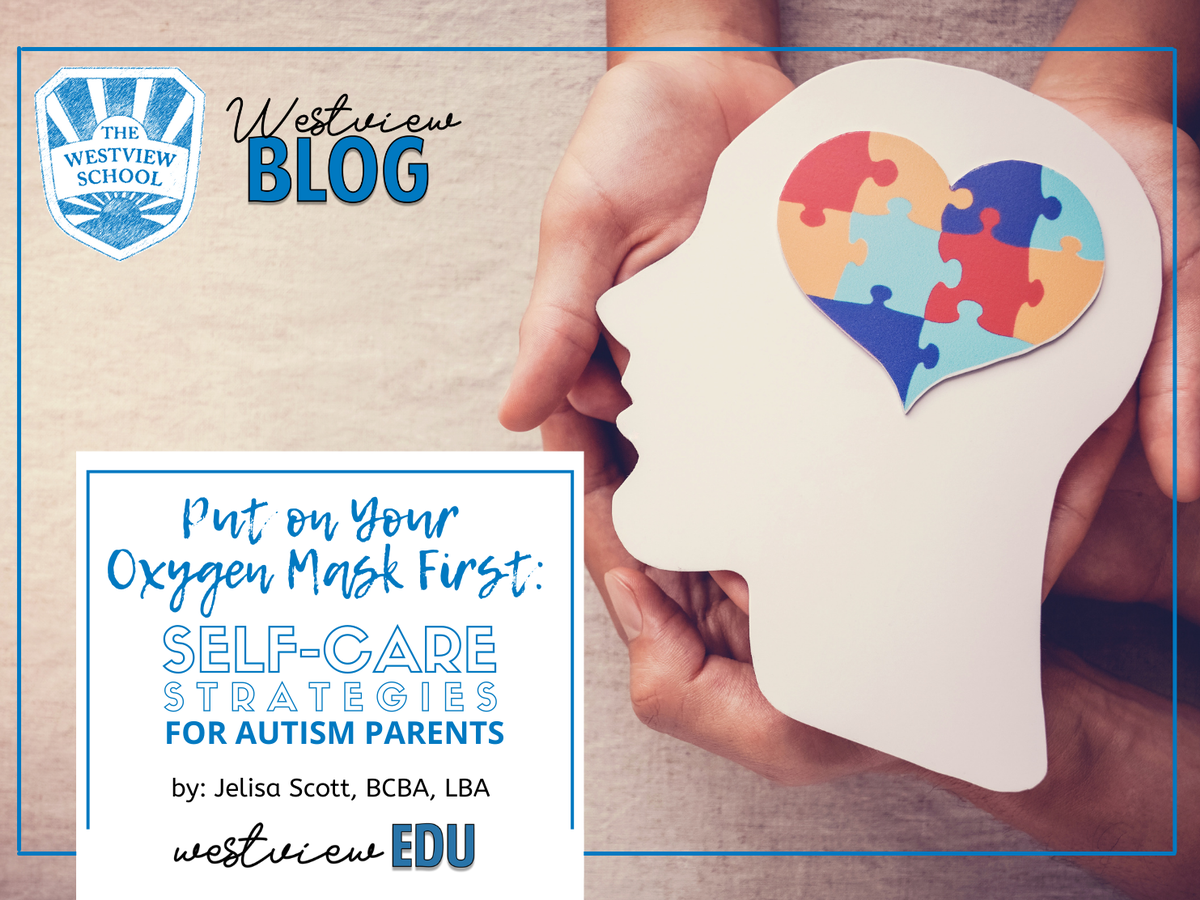
When it comes to parenting a special needs child, there are many things to consider: therapies, schools, medications, the list goes on. However, arguably one of the most essential therapeutic strategies to help your child is evaluating and caring for yourself. To have the physical and emotional energy to fulfill all the duties of a parent (especially an autism parent), you must make sure you are mentally healthy. How many times have we been on an airplane and heard the flight attendant advise, "in case of an emergency, secure YOUR OWN oxygen before helping others next to you." In the case of raising a child with autism, it is essential to "secure your own oxygen" before you can be expected to help your child. Parents who are stressed, feeling anxious about the future, or having depressed feelings about their child's current stage of development, are more likely to have trouble helping and supporting their child in the ways they need. If you really want to help your child, challenge yourself to make these parent coping strategies a habit:
1. Prioritize your self-care.
There's an old adage that says, "empty cups can't pour." Think about the things that fill your cup, and make time to prioritize them. Taking care of yourself is a selfless act because it sets you up to be in the best position possible to continue to advocate and care for your child's needs.
2. Engage with other Autism parents in the community.
You are not alone. Other parents and caregivers of children on the autism spectrum are going through similar situations as you. Expand your social circle to include support from other parents who understand what you experience. Shared experiences help build connections and can decrease feelings of depression, anxiety, and isolation.
3. Minimize anxiety by staying present.
The past is already done, and the future is not promised. Remind yourself to focus on today. When you worry about the future, you miss an opportunity to be grateful for what you have in the now. Be intentional about identifying what you are thankful for right now to help minimize your anxieties about the future.
4. Focus on your child's strengths.
Try not to focus on the negative. It is much more beneficial to focus on your child's strengths. There is no advantage mentally or emotionally to only see your child for the things they can't do. Knowing where your child's strengths lie and keeping them at the forefront can help you use that knowledge to supplement the areas where they need more support.
5. Plan time for fun.
All work and no play does not equal success. Sometimes your child (and you) need a break from it all. Taking time out from the hard work to laugh and play can improve your overall quality of life.
Remember, you are the most important person to your child, and they need you to be physically, emotionally, and mentally strong. Your child needs you to be strong enough to continuously advocate for their acceptance, accommodations, and inclusion within their community. Being strong doesn't mean that you won't have bad days. Improving your well-being doesn't mean that there won't be challenging times, but hopefully, these strategies will help you build healthy self-care habits and, in turn, will help you work better with your child at home.
--
Jelisa Scott is a Board Certified Behavior Analyst (BCBA) and a Licensed Behavior Analyst (LBA) in the state of Texas. She received her bachelor's in Psychology from Louisiana State University in 2010, her master’s degree in Behavior Analysis from the University of Houston Clear Lake in 2014 and is currently in school to earn her doctorate degree in School Psychology from the University of Houston. Jelisa has been working with children with and without special needs since 2008 and has gained experience providing in-home ABA services, parent training, classroom consultations, navigating ARD meetings, decreasing severe problem behavior, improving verbal behavior, social skills training, and early childhood intervention.
This blog post was adapted from the presentation given during WestviewEDU on Thursday, October 7, 2021. WestviewEDU is an education series presented by The Westview School for parents and caregivers of children with autism spectrum disorder. For a full list of WestviewEDU sessions for 2021/2022 academic calendar year, visit The Westview School online.
Memories of Our Mother: A History of The Westview School

To commemorate the fortieth anniversary of The Westview School, the sons of founder, Jane Stewart shared a personal reflection of their early memories of The Westview School and what the legacy of 40 years of Westview means to their family.
A little over forty years ago our mother, Jane Stewart, brought us (Joey, Alan and Steven) all together in the family room and told us she was starting a school for children with disabilities. She had been volunteering at The Briarwood School for a few years and a group of parents came to her and asked if she would consider teaching their children privately. These parents recognized our mother's compassion and love for all children.
Overjoyed that Jane could now offer personal attention and schooling to a population in need of facilities, she turned our “game room” into a school during the day. We have many wonderful memories of coming home from school and watching our mother teaching and caring for her students. Often, we would join our mother rather than playing video games. That time was always very special to us. The parents were ecstatic, and the children made remarkable progress during the time they were with our mother in our home. In fact, one of our mother's first students, whose doctor told her parents she couldn't be helped, years later not only graduated from high school but was also prom queen. Our mother knew that amazing things were in all of us.
After a long discussion, our mother and father, Joel Stewart, decided to purchase a small house on Westview Drive in the Spring Branch area of Houston to expand the school, its facilities, and number of students. The Westview School was born as was the beginning of one of the most successful and ground-breaking schools for children on the autism spectrum in the country. This was a defining moment for our mother, one which filled our family with pride and love. The growth of the school meant so much to her.
As The Westview School evolved, so did our involvement as a family. Alongside our mother was our father, who not only gave his generous support to the school but also brought with him his financial and regulatory acumen. Additionally, throughout high school, we volunteered our summers working various jobs doing maintenance, painting, and building on the school grounds. The most rewarding was when we volunteered as teachers' aids, running with the children on the playground, helping with art projects, singing Heads, Shoulders, Knees, and Toes, and even happily laughing and getting soaked with the students on the slip and slide. These are the types of experiences that are so memorable and special to us.
The expansion of the school to its current location on Kersten Drive was one of the most incredible experiences of our lives. We were honored to have the late Barbara Bush preside over the opening ceremony. She graciously spent time with the students and recognized the importance of the school. This was an experience we will never forget. Most importantly, there would be a much larger school that could accommodate the growing population and could offer even more benefits to the students including a robust multidisciplinary team. Our mother made sure there was a small student-teacher ratio so that the current students received the same personal attention as her first students received in our game room.
The school expanded once again and added another building offering even more opportunities to students. Throughout the forty years, there have been many talented and brilliant individuals who have worked at the school and served on the Board to turn the school into what it is today. We are grateful that the school and staff have committed to the mission of our mom in providing a nurturing and positive environment. The teachers and the entire staff are dedicated and caring individuals. We continue to be impressed by the incredible work and enjoy watching the school and the students thrive.
Throughout our lives, we always felt that our mother was a miracle worker, and it really showed when she worked with children. Her caring, gentle and intelligent approach, based in love for each and every student, showed through at all times.
---
Joey Stewart is a feature film producer and restaurateur that lives in Dallas with his wife Laura, an interior designer.
Alan Stewart is happy to coordinate marketing and VIP programs for music, wine and NFL clients including Duran Duran, Matt & Kim, Westport Rivers Winery, and the Indianapolis Colts. He lives on a farm on the coast of Maine with his wife Lisa who is in the legal field.
Steve Stewart is a physician and Chief Medical Officer of a hospital in New Mexico and lives in Albuquerque with his wife Amy, a lawyer, and their two sons, Wells and Flynn.
Staying Safe at COVID-19 Level 1 in Houston

It seems like déjà vu that we are starting this school year with masks and health screenings again, but we’ve had some noteworthy scientific progress compared to this time last year. Hopefully these changes will make life a little more manageable and get us closer to being done with COVID!
There are so many things we were doing last year that we no longer need to do, since we know more about COVID-19. We don’t need to: wipe down our groceries with Clorox wipes, avoid takeout (no more missing out on Houston’s amazing restaurants!), or hide in our houses 24/7 (although sometimes it’s nice to catch up on Netflix!).
We just need to:
- Get vaccinated against COVID-19 when you’re eligible. When your children are eligible for the vaccine, get them vaccinated as well- currently only children 12 years and older can be vaccinated. Also, plan to get a booster shot when you’re eligible (currently, approximately 8 months after your 2nd dose of Pfizer or Moderna). If you have questions about the vaccines, check out our previous blog post on the topic.
- Maintain physical distance from others. While we have high rates of COVID-19 in Houston, try to stay away from others, even outdoors, and avoid large indoor gatherings.
- Wash your hands often. Soap and water is best, but hand sanitizer is a great option too.
- Wear a mask, especially in indoor space and even if you’re already vaccinated.
- Keep monitoring your personal and your family’s health. Watch for symptoms of COVID-19, even if you’re vaccinated. The most common symptoms of the delta variant COVID-19 are runny nose, sore throat, headache, and fever, which are also allergy symptoms in Houston! Take a COVID-19 test if you are experiencing any signs of illness.
- Maintain your hobbies and your support system. Now, more than ever, we need to keep up our spirits and keep an eye on our mental health.
As a community, we’ve banded together time and time again to face numerous challenges for our children. We know that this is one more trial that the Westview Wildcats are ready to meet. We are strong, flexible, and caring, and we can do this! Hopefully, we can help all of Houston get COVID-19 under control too, so we can truly put this pandemic time behind us for good.
3 No-Nonsense Answers to Common Questions on Special Education
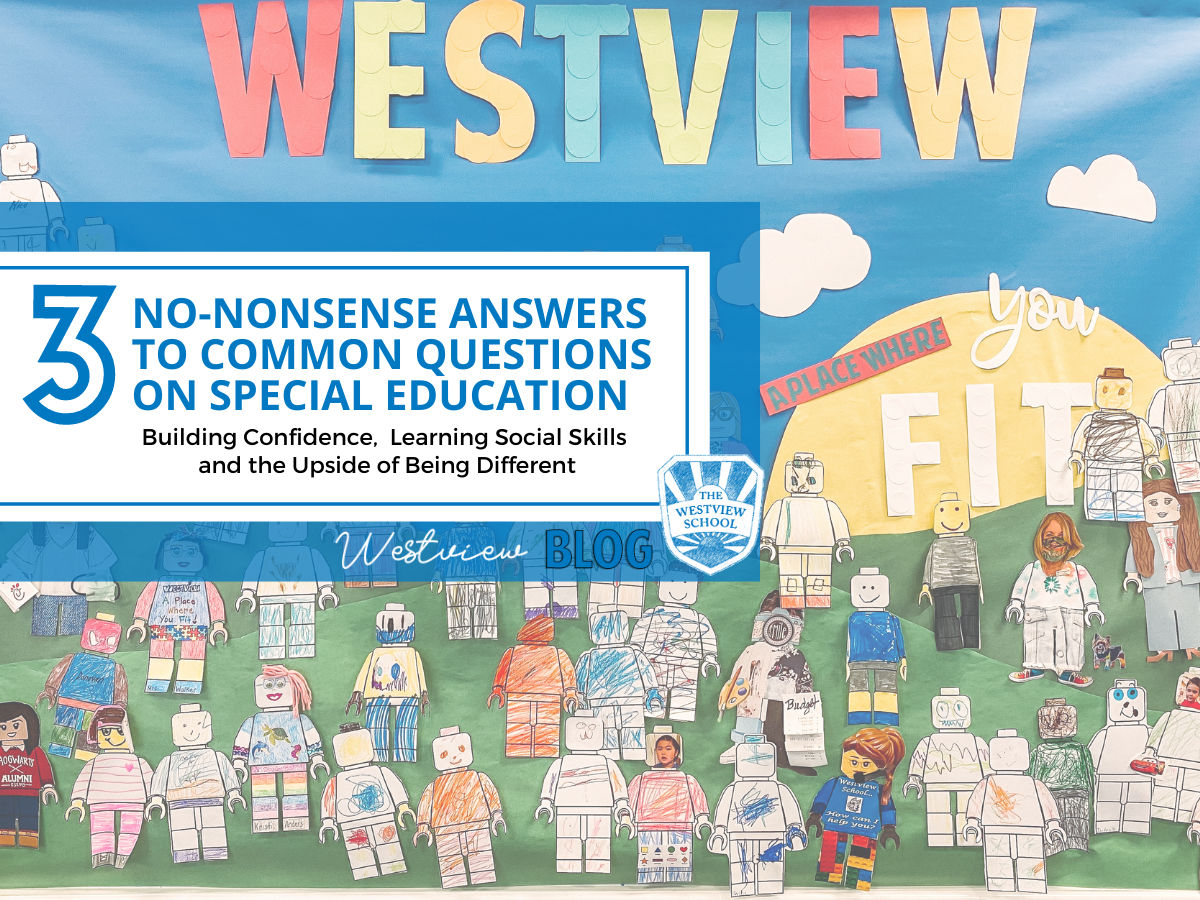
Did you know that tigers have striped skin and not just striped fur?
Did you know that reticulated pythons are longer than green anacondas?
Did you know the formula for the volume of spheres is four-thirds times Pi times radius cubed?
Did you know that honey is actually just bee vomit?
There is a common saying within the autism community, "If you've met one child with autism, you've met one child with autism." Facts and insight collected from various students across various grade levels prove the point that we can always learn something from someone else. Like the students at The Westview School, these little nuggets of information are as different and varied as those who shared them.
With enrollment season upon us, the admissions department of The Westview School is busy fielding questions about the benefits of a private special needs education. Families are looking for the best fit for their children. The Westview School is proud to offer children on the autism spectrum a unique, specialized learning environment with outstanding educational and social opportunities. Some of the obvious benefits of a specialized special needs school include small classroom sizes and curriculum and instruction that is adapted based on each student's need. But there is much more that a school like Westview can provide a child that is not so easily quantified.
We asked our in-house experts, Becky Mattis, M.Ed., Admissions Director for The Westview School, and Mimi Le, M.A., LMFT, LPC, one of Westview’s Student and Staff Support Specialists, to weigh in on commonly asked questions prospective families have when deciding on a program like The Westview School. Their no-nonsense answers to the top three prospective family concerns about a private specialized education are supported by frank, heartfelt, and honest feedback from Westview students in elementary and middle school.
QUESTION 1: Will my child develop self-confidence?
One thing a parent of a child with autism learns very early on is that brains can grow. Developmental pediatricians and neurologists will tell parents, early intervention is the key, that a child's potential cannot be determined until they have an opportunity to learn. Children on the autism spectrum who participate in early intervention therapies and specialized schooling from an early age develop a growth mindset. The concept of a growth mindset was originally taught by Stanford Professor, Carol Dweck. She asserts that facing challenges, working hard, and learning from mistakes develops persistence and results in growth in intelligence and abilities. She further theorizes that people who develop a growth mindset at a young age are confident, resilient, and have a passion for learning. At The Westview School, you will frequently hear a teacher encouraging a student who is struggling with something say, "That's okay, you can try again." Instead of becoming frustrated when they make a mistake, we want our students to quickly regroup and try again.
Becky Mattis: Parents worry about self-esteem for their special needs child. The self-esteem impact that kids have when they are in a place that is meeting their needs, and they are learning and being successful is vastly greater than the negative impact that being in a place where their needs are not met, and they are feeling different and singled out.
Mimi Le: There is a vulnerability [at Westview] that you do not get in a neurotypical school setting. The vulnerability is that I am not the best at this. How can I get better? Both peers and teachers work together to help and encourage you. This may still happen in a neurotypical setting, but at Westview, we are very aware of it, and we make it part of each day, and so do our students.
When a student feels like they can excel at something new, they feel supported in their effort, and in turn, the other students in their class help that too. Students want to learn from the kid that is the expert on trains or the best at math. At Westview, there is never the social expectation to fit into the typical school social norms. There is no judgment. This builds confidence in a child when they are around others that support their expertise in something.
We asked Westview students, “What is your favorite thing about The Westview School?”
Jaden, Middle School: The teachers will go completely out of their way, will do anything they can to see their students succeed. They are always so nice and supportive, and I could not have any better teachers.
Thibault, Upper Elementary: I like this place because it provides a safe place. A safe place from bullies. [Westview] gives me a safe place to learn, and it achieves all its goals in doing so with all its students.
Noah, Middle School: I think The Westview School is a great place to be. The teachers, the classrooms, the fun things we get to do.
Cason, Middle School: My favorite things about The Westview School are the people, the academics. Look around [gesturing down the hallway]; this place looks pretty good.
Ruby, Lower Elementary: My teachers and everybody loves me and PE.
Theo, Lower Elementary: I have lots of friends to play with, and I learn things that I never knew before, and just like Ruby said, I like PE.
QUESTION 2: How will my child learn appropriate social skills without typical peer role models?
Becky Mattis: It is a common question for prospective parents, "Why not just put our child in a mainstream school to learn and observe social skills?" If our children could naturally pick up social and classroom skills from their neurotypical peers, they would easily fit into a mainstream setting. At The Westview School, we get excited when our kids pick up other behaviors because we can then use that as a building block for teaching and guiding our students toward a more appropriate social interaction. By virtue of the population, most of our students struggle with social skills, and because of that, we are intentional in working on the development of social skills throughout the day. The child is not being singled out by being pulled away to talk through those social situations. It is a learning experience for the whole class.
Mimi Le: When children on the autism spectrum are with others who are like them, they are more accepting of individuals with differences. When we put students together in a group or a class, we are looking at where are they are going to fit socially, behaviorally, and academically, so that they can learn something from another student. Where one student may be best at a particular thing, another student can learn from them. Everyone is learning from each other in those three different categories, which helps make them more well-rounded. All kids are different, autism or not. There is always something you can learn from someone else. The thought Westview puts in to placing our students helps to build a respect and appreciation for each other that they would not get in a normal neurotypical setting.
We asked Westview students, “What is something that your friends like about you? What makes you a good friend?
Jaden, Middle School: I am very persistent, and I will do what I can even if it must sacrifice quite a lot to get done what I need to do. I think that me knowing a lot makes me special because I get to teach people what I know, and I find teaching very fun.
Thibault, Upper Elementary: I am passionate, and I strive to work hard almost every single day. I am determined.
Theo, Lower Elementary: I like to run around and exercise a lot and play games. I like to play games on the playground besides tag, because my best friend Sid doesn’t like tag. I like it, but I want to play with him.
QUESTION 3: What if my child knows they are different?
We are all different, and differences should be celebrated, and all children should be taught in a way that most benefits them. In October of 2020, a teacher’s online post on why her neurotypical classroom looks like a special education one went viral. Karen Blacher, who has two children on the autism spectrum herself, found that students benefit greatly when classroom strategies are more focused on encouraging students to openly communicate, and expectations are adapted specifically to that child. Students are taught to both self-advocate and self-regulate.
Becky Mattis: We recognize that all kids are different whether they are on the spectrum or not. Each of our Westview children will discover the ways they learn best and how to then advocate for themselves. Self-advocacy is not only a skill they need for school but in life as well. Being accepting of the things that challenge them.
Mimi Le: Our kids become comfortable with who they are. It is okay to be different. Our kids develop an appreciation for themselves and each other. They are learning that their differences can be something they are proud of, and we foster that in the classrooms and through our conversations with parents. Our students will continue to give the world a new perspective on every aspect of life, and this new lens will lead to breakthroughs in the future.
With cultivating confidence in mind, we asked several Westview students, “What makes you special?”
Cason, Middle School: To be honest, I think I am pretty smart and good at gaming. I am probably the smartest in math. My brain works a little differently than everyone else. It can be good or bad in different ways.
Satvik, Middle School: I am a very tall person, and I am a hardworking boy.
Thibault, Upper Elementary: What makes me special is that I am different from everyone else, and it is like a whole different experience. Without these differences, I wouldn't have gone to Westview in the first place, and my sisters love me literally for who I am.
The Westview School’s mission is to provide a unique, specialized learning environment offering outstanding educational and social opportunities for children on the autism spectrum. We believe that children with autism spectrum disorder can grow and learn through a nurturing, positive, and happy environment that enhances their self-esteem. Building confidence, learning social skills and celebrating our differences is something that The Westview School builds into our daily curriculum.
If you think The Westview School could be a fit for your child, join us for our next Informational Session. The event includes discussions with our Admissions Director, Becky Mattis, about the student experience and program deliverables. Current parents will also be present to offer perspective and answer questions.

I am proud to be part of your teacher (music) community from 2002 through 2018.
Jane was an inspiration to each and every teacher at WESTVIEW!